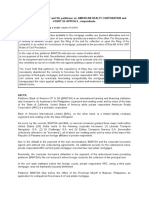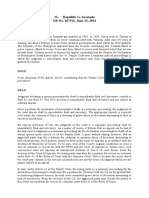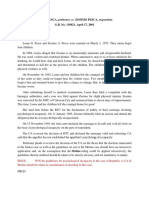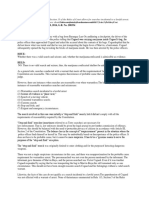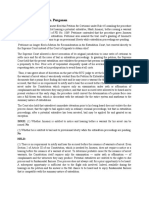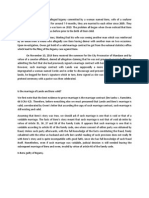0 ratings0% found this document useful (0 votes)
128 viewsU.S Vs Purganan
U.S Vs Purganan
Uploaded by
Robinson Flores1. The case involves an extradition petition filed by the U.S. against Jimenez through the Philippine DOJ.
2. The trial court judge allowed Jimenez to be heard before issuing an arrest warrant, which the petitioner claimed was done without jurisdiction.
3. The Supreme Court ruled the trial court judge committed grave abuse of discretion by allowing a hearing before arrest, as the extradition law calls for the "immediate" arrest of the accused. Extradition proceedings determine extraditability rather than guilt.
Copyright:
© All Rights Reserved
Available Formats
Download as DOCX, PDF, TXT or read online from Scribd
U.S Vs Purganan
U.S Vs Purganan
Uploaded by
Robinson Flores0 ratings0% found this document useful (0 votes)
128 views2 pages1. The case involves an extradition petition filed by the U.S. against Jimenez through the Philippine DOJ.
2. The trial court judge allowed Jimenez to be heard before issuing an arrest warrant, which the petitioner claimed was done without jurisdiction.
3. The Supreme Court ruled the trial court judge committed grave abuse of discretion by allowing a hearing before arrest, as the extradition law calls for the "immediate" arrest of the accused. Extradition proceedings determine extraditability rather than guilt.
Original Description:
case digest in the Philippines regarding Legislative process
Original Title
U.S vs Purganan
Copyright
© © All Rights Reserved
Available Formats
DOCX, PDF, TXT or read online from Scribd
Share this document
Did you find this document useful?
Is this content inappropriate?
1. The case involves an extradition petition filed by the U.S. against Jimenez through the Philippine DOJ.
2. The trial court judge allowed Jimenez to be heard before issuing an arrest warrant, which the petitioner claimed was done without jurisdiction.
3. The Supreme Court ruled the trial court judge committed grave abuse of discretion by allowing a hearing before arrest, as the extradition law calls for the "immediate" arrest of the accused. Extradition proceedings determine extraditability rather than guilt.
Copyright:
© All Rights Reserved
Available Formats
Download as DOCX, PDF, TXT or read online from Scribd
Download as docx, pdf, or txt
0 ratings0% found this document useful (0 votes)
128 views2 pagesU.S Vs Purganan
U.S Vs Purganan
Uploaded by
Robinson Flores1. The case involves an extradition petition filed by the U.S. against Jimenez through the Philippine DOJ.
2. The trial court judge allowed Jimenez to be heard before issuing an arrest warrant, which the petitioner claimed was done without jurisdiction.
3. The Supreme Court ruled the trial court judge committed grave abuse of discretion by allowing a hearing before arrest, as the extradition law calls for the "immediate" arrest of the accused. Extradition proceedings determine extraditability rather than guilt.
Copyright:
© All Rights Reserved
Available Formats
Download as DOCX, PDF, TXT or read online from Scribd
Download as docx, pdf, or txt
You are on page 1of 2
U.
S VS JUDGE PURGANAN (SEQUEL TO LANTION)
Previous Case was dismissed but was overturned after a
motion for reconsideration was filed by SOJ. It held that
private respondent was bereft of the right to notice and
hearing during the evaluation stage of the extradition
process. This Resolution has become final and
executory.
Finding no more legal obstacle, the Government of the
United States of America, represented by the Philippine
DOJ, filed with the RTC on May 18, 2001, the
appropriate Petition for Extradition
Before the RTC could act on the Petition,
Respondent Jimenez filed before it an Urgent
Manifestation/Ex-Parte Motion,
[
which prayed that
petitioners application for an arrest warrant be set for
hearing. In its assailed May 23, 2001 Order, the RTC
granted the Motion of Jimenez and set the case for
hearing on June 5, 2001. In that hearing, petitioner
manifested its reservations on the procedure adopted
by the trial court allowing the accused in an extradition
case to be heard prior to the issuance of a warrant of
arrest.
After the hearing, the court a quo required the
parties to submit their respective memoranda. In his
Memorandum, Jimenez sought an alternative prayer:
that in case a warrant should issue, he be allowed to
post bail in the amount ofP100,000.
The alternative prayer of Jimenez was also set for
hearing on June 15, 2001. Thereafter, the court below
issued its questioned July 3, 2001 Order, directing the
issuance of a warrant for his arrest and fixing bail for his
temporary liberty at one million pesos in cas. After he
had surrendered his passport and posted the required
cash bond, Jimenez was granted provisional liberty via
the challenged Order dated July 4, 2001
Hence, this Petition
[
The public respondent acted without or in excess of
jurisdiction or with grave abuse of discretion amounting
to lack or excess of jurisdiction in adopting a procedure
of first hearing a potential extraditee before issuing an
arrest warrant under Section 6 of PD No. 1069
(1) whether Jimenez is entitled to notice and hearing
before a warrant for his arrest can be issued,
It is significant to note that Section 6 of PD 1069, our
Extradition Law, uses the word immediate to qualify
the arrest of the accused. Arrest subsequent to a
hearing can no longer be considered immediate.
it is evident that respondent judge could have already
gotten an impression from these records adequate for
him to make an initial determination of whether the
accused was someone who should immediately be
arrested in order to best serve the ends of justice. He
could have determined whether such facts and
circumstances existed as would lead a reasonably
discreet and prudent person to believe that the
extradition request was prima facie meritorious. In
point of fact, he actually concluded from these
supporting documents that probable cause did exist
Hence, after having already determined therefrom that
a prima facie finding did exist, respondent judge gravely
abused his discretion when he set the matter for
hearing upon motion of Jimenez
In connection with the matter of immediate arrest,
however, the word hearing is notably absent from the
provision. Evidently, had the holding of a hearing at
that stage been intended, the law could have easily so
provided.
Even Section 2 of Article III of our Constitution, which is
invoked by Jimenez, does not require a notice or a
hearing before the issuance of a warrant of arrest.
To determine probable cause for the issuance of arrest
warrants, the Constitution itself requires only the
examination -- under oath or affirmation --
of complainants and the witnesses they may
produce. There is no requirement to notify and hear
the accused before the issuance of warrants of arrest.
An extradition [proceeding] is sui generis. It is not a
criminal proceeding which will call into operation all the
rights of an accused as guaranteed by the Bill of
Rights. To begin with, the process of extradition does
not involve the determination of the guilt or innocence
of an accused. His guilt or innocence will be adjudged
in the court of the state where he will be
extradited. Hence, as a rule, constitutional rights that
are only relevant to determine the guilt or innocence of
an accused cannot be invoked by an extradite
5 postulates of extradition.
1. Extradition Is a Major Instrument for the
Suppression of Crime.
2. The Requesting State Will Accord Due Process to
the Accused
3. The Proceedings Are Sui Generis
4. Compliance Shall Be in Good Faith. (pacta sunt
Servanda
Fourth, our executive branch of government voluntarily
entered into the Extradition Treaty, and our legislative
branch ratified it. Hence, the Treaty carries the
presumption that its implementation will serve the
national interest.
This principle requires that we deliver the accused to
the requesting country if the conditions precedent to
extradition, as set forth in the Treaty, are satisfied.
5. There Is an Underlying Risk of Flight
The present extradition case further validates the
premise that persons sought to be extradited have a
propensity to flee. Indeed, extradition hearings would
not even begin, if only the accused were willing to
submit to trial in the requesting country
Is Respondent Entitled to Bail?
Extradition Different from Ordinary Criminal
Proceedings
To stress, extradition proceedings are separate and
distinct from the trial for the offenses for which he is
charged. He should apply for bail before the courts
trying the criminal cases against him, not before the
extradition court.
Contrary to his contention, his detention prior to the
conclusion of the extradition proceedings does not
amount to a violation of his right to due process. We
iterate the familiar doctrine that the essence of due
process is the opportunity to be heard but, at the same
time, point out that the doctrine does not always call
for a prior opportunity to be heard. Where the
circumstances -- such as those present in an extradition
case -- call for it, a subsequent opportunity to be heard
is enough.
1. The ultimate purpose of extradition proceedings is to determine
whether the request expressed in the petition, supported by its annexes and the
evidence that may be adduced during the hearing of the petition, complies with
the Extradition Treaty and Law; and whether the person sought is
extraditable. The proceedings are intended merely to assist the requesting state
in bringing the accused -- or the fugitive who has illegally escaped -- back to its
territory, so that the criminal process may proceed therein.
2. By entering into an extradition treaty, the Philippines is deemed to have
reposed its trust in the reliability or soundness of the legal and judicial system of
its treaty partner, as well as in the ability and the willingness of the latter to grant
basic rights to the accused in the pending criminal case therein.
3. By nature then, extradition proceedings are not equivalent to a criminal
case in which guilt or innocence is determined. Consequently, an extradition case
is not one in which the constitutional rights of the accused are necessarily
available. It is more akin, if at all, to a courts request to police authorities for the
arrest of the accused who is at large or has escaped detention or jumped
bail. Having once escaped the jurisdiction of the requesting state, the reasonable
prima facie presumption is that the person would escape again if given the
opportunity.
4. Immediately upon receipt of the petition for extradition and its
supporting documents, the judge shall make a prima facie finding whether the
petition is sufficient in form and substance, whether it complies with the
Extradition Treaty and Law, and whether the person sought is extraditable. The
magistrate has discretion to require the petitioner to submit further
documentation, or to personally examine the affiants or witnesses. If convinced
that a prima facie case exists, the judge immediately issues a warrant for the
arrest of the potential extraditee and summons him or her to answer and to
appear at scheduled hearings on the petition.
5. After being taken into custody, potential extraditees may apply for
bail. Since the applicants have a history of absconding, they have the burden of
showing that (a) there is no flight risk and no danger to the community; and (b)
there exist special, humanitarian or compelling circumstances. The grounds used
by the highest court in the requesting state for the grant of bail therein may be
considered, under the principle of reciprocity as a special circumstance. In
extradition cases, bail is not a matter of right; it is subject to judicial discretion in
the context of the peculiar facts of each case.
6. Potential extraditees are entitled to the rights to due process and to
fundamental fairness. Due process does not always call for a prior opportunity to
be heard. A subsequent opportunity is sufficient due to the flight risk
involved. Indeed, available during the hearings on the petition and the answer is
the full chance to be heard and to enjoy fundamental fairness that is compatible
with the summary nature of extradition.
7. This Court will always remain a protector of human rights, a bastion of
liberty, a bulwark of democracy and the conscience of society. But it is also well
aware of the limitations of its authority and of the need for respect for the
prerogatives of the other co-equal and co-independent organs of government.
8. We realize that extradition is essentially an executive, not a judicial,
responsibility arising out of the presidential power to conduct foreign relations
and to implement treaties. Thus, the Executive Department of government has
broad discretion in its duty and power of implementation.
9. On the other hand, courts merely perform oversight functions and
exercise review authority to prevent or excise grave abuse and tyranny. They
should not allow contortions, delays and over-due process every little step of
the way, lest these summary extradition proceedings become not only inutile but
also sources of international embarrassment due to our inability to comply in
good faith with a treaty partners simple request to return a fugitive. Worse, our
country should not be converted into a dubious haven where fugitives and
escapees can unreasonably delay, mummify, mock, frustrate, checkmate and
defeat the quest for bilateral justice and international cooperation.
10. At bottom, extradition proceedings should be conducted with all
deliberate speed to determine compliance with the Extradition Treaty and Law;
and, while safeguarding basic individual rights, to avoid the
legalistic contortions, delays and technicalities that may negate that purpos
e.
international law becomes a part of the law of the land when there
is a positive act on the part of the government (transformation)
international law forms part with domestic law automatically
without the need of positive act of government (incorporation)
You might also like
- Trillanes IV Vs Pimentel - Section1 Equal ProtectionDocument1 pageTrillanes IV Vs Pimentel - Section1 Equal ProtectionpiptipaybNo ratings yet
- Legal Memo and Client Letter SampleDocument3 pagesLegal Memo and Client Letter SampleRobinson Flores100% (2)
- Presumptions in Aid of ConstructionDocument19 pagesPresumptions in Aid of ConstructionRobinson Flores100% (3)
- Heirs of DR Mariano Favis SR Vs Juana GonzalesDocument2 pagesHeirs of DR Mariano Favis SR Vs Juana GonzalessakuraNo ratings yet
- Search and Sezure CasesDocument15 pagesSearch and Sezure CasesDon YcayNo ratings yet
- Criminal Law I: SAMPLE QUESTIONS ( 97 Midterm)Document2 pagesCriminal Law I: SAMPLE QUESTIONS ( 97 Midterm)Rodolfo Dagooc Jr.No ratings yet
- Injustice Based On His Foreign CitizenshipDocument1 pageInjustice Based On His Foreign Citizenshipbryan168No ratings yet
- 9 People Vs MendozaDocument2 pages9 People Vs MendozaKat Dela PazNo ratings yet
- Urbano Vs - IACDocument2 pagesUrbano Vs - IACSpica ZaniahNo ratings yet
- Balsamo v. People G.R. No. 260109 April 12 2023Document10 pagesBalsamo v. People G.R. No. 260109 April 12 2023Wolfgang Amadeus MozNo ratings yet
- Tax1 Notes With TrainDocument57 pagesTax1 Notes With TrainYeahboi100% (1)
- PEOPLE OF THE PHILIPPINES, Plaintiff-Appellee, vs. NELSON ABON Y NOVIDO, Accused-Appellant. FactsDocument4 pagesPEOPLE OF THE PHILIPPINES, Plaintiff-Appellee, vs. NELSON ABON Y NOVIDO, Accused-Appellant. FactsRZ ZamoraNo ratings yet
- Succession Week 1 - Prof. ReynanteDocument9 pagesSuccession Week 1 - Prof. ReynanteNei AFNo ratings yet
- Labor Law Case DigestDocument9 pagesLabor Law Case Digestdyajee1986No ratings yet
- Villegas Vs Hu Chong Tsai Pao HoDocument7 pagesVillegas Vs Hu Chong Tsai Pao HoAriel LunzagaNo ratings yet
- Republic vs. Orbecido (DAYRIT)Document2 pagesRepublic vs. Orbecido (DAYRIT)Alex MelegritoNo ratings yet
- 2007 Onwards Evidence BarqsDocument4 pages2007 Onwards Evidence Barqsjade123_129No ratings yet
- Lim Vs Felix Rule 113 12 5 15Document2 pagesLim Vs Felix Rule 113 12 5 15Jhudith De Julio BuhayNo ratings yet
- Case Digest On William Garaygay VsDocument8 pagesCase Digest On William Garaygay VsKuthe Ig TootsNo ratings yet
- Teksystems Inc. v. Hammernik 10-CV-00819 (PJS-SRN) (D. Minn. Oct. 18, 2010 (Order For Permanent Injunction)Document8 pagesTeksystems Inc. v. Hammernik 10-CV-00819 (PJS-SRN) (D. Minn. Oct. 18, 2010 (Order For Permanent Injunction)Venkat BalasubramaniNo ratings yet
- REPUBLIC V CagandahanDocument1 pageREPUBLIC V CagandahanRekaire YantoNo ratings yet
- Cortes Vs CADocument1 pageCortes Vs CANicole Marie Abella CortesNo ratings yet
- 67 Pacific Wide Realty and Dev T Corp Vs Puerto Azul Land Inc 2009Document5 pages67 Pacific Wide Realty and Dev T Corp Vs Puerto Azul Land Inc 2009ronilarbisNo ratings yet
- PP v. YutilaDocument2 pagesPP v. Yutilacymon_argawanon6040No ratings yet
- 1 Feria Vs CADocument1 page1 Feria Vs CAJeah N MelocotonesNo ratings yet
- Montemayor vs. BermejoDocument9 pagesMontemayor vs. BermejoAdrianne BenignoNo ratings yet
- ValientesDocument2 pagesValientesRaamah DadhwalNo ratings yet
- Manalili V. Court of Appeals FactsDocument1 pageManalili V. Court of Appeals Factscristilyn pangosfianNo ratings yet
- Case No. 1 Heirs of Montinola Vs CADocument2 pagesCase No. 1 Heirs of Montinola Vs CAChiic-chiic Salamida0% (1)
- 183 Time of Arrest People vs. CalimlimDocument2 pages183 Time of Arrest People vs. CalimlimChristopher Anniban SalipioNo ratings yet
- Lastimosa Vs VasquezDocument2 pagesLastimosa Vs VasquezJolo CoronelNo ratings yet
- RULE74-78 CasesDocument12 pagesRULE74-78 CasesBhengMifañaNo ratings yet
- Criminal Law 2 CasesDocument33 pagesCriminal Law 2 CasesAtty. Providencio AbraganNo ratings yet
- Alba vs. Court of AppealsDocument19 pagesAlba vs. Court of AppealsDianne May CruzNo ratings yet
- Llorente vs. CADocument3 pagesLlorente vs. CAzeynNo ratings yet
- Bank of America v. American RealtyDocument4 pagesBank of America v. American RealtyAllyza RamirezNo ratings yet
- Dorotheo Vs CADocument5 pagesDorotheo Vs CAMi-young SunNo ratings yet
- 012 DECS V San DiegoDocument1 page012 DECS V San DiegoyousirneighmNo ratings yet
- La Mallorca v. CA - 17 SCRA 739Document6 pagesLa Mallorca v. CA - 17 SCRA 739springchicken88No ratings yet
- Republic Vs GranadaDocument1 pageRepublic Vs GranadaChris Ronnel Cabrito CatubaoNo ratings yet
- Municipal and International LawDocument11 pagesMunicipal and International LawShikhaNo ratings yet
- 3 Concerned Citizens v. Judge ElmaDocument3 pages3 Concerned Citizens v. Judge ElmaryanmeinNo ratings yet
- Govt of Hongkong v. OlaliaDocument3 pagesGovt of Hongkong v. OlaliaAngeline RodriguezNo ratings yet
- SP GuardianshipDocument23 pagesSP GuardianshipDia Mia BondiNo ratings yet
- TITLE VIII - Physical InjuriesDocument71 pagesTITLE VIII - Physical InjuriesJohn Henry ValenciaNo ratings yet
- Qua Chee Gan v. Deportation BoardDocument2 pagesQua Chee Gan v. Deportation Boardsigrid ramaeNo ratings yet
- Republic Act No. 9285Document19 pagesRepublic Act No. 9285Danny DayanNo ratings yet
- Marasigan Vs FuentesDocument8 pagesMarasigan Vs Fuentesdoora keysNo ratings yet
- CENOMAR Application Form PDFDocument1 pageCENOMAR Application Form PDFIdsil Cabredo0% (1)
- Final Exam Legal Medicine Sy 2020Document1 pageFinal Exam Legal Medicine Sy 2020JV DeeNo ratings yet
- 46 People v. TundagDocument3 pages46 People v. TundagGain DeeNo ratings yet
- Pesca v. PescaDocument2 pagesPesca v. PescaDredd LelinaNo ratings yet
- Amatorio Vs YapDocument7 pagesAmatorio Vs YapjwualferosNo ratings yet
- Juvenile ActDocument3 pagesJuvenile ActCharles DBNo ratings yet
- Tolentino v. ComelecDocument85 pagesTolentino v. ComelecCamille Yasmeen SamsonNo ratings yet
- Spec Pro Finals WordDocument443 pagesSpec Pro Finals WordRomeo Boy-ag Jr.No ratings yet
- 3-T PP Vs AcostaDocument2 pages3-T PP Vs AcostaShaine Aira ArellanoNo ratings yet
- Rule 126Document18 pagesRule 126GabrielNo ratings yet
- Government of The US Vs Judge PurugananDocument5 pagesGovernment of The US Vs Judge PurugananVINA LORRAINE MARASIGANNo ratings yet
- Government of USA Vs PurgananDocument3 pagesGovernment of USA Vs PurgananChristina AureNo ratings yet
- USA V Hon. PurgananDocument5 pagesUSA V Hon. Purganansally deeNo ratings yet
- Us V Purganan DigestDocument3 pagesUs V Purganan DigestAlexis Anne P. ArejolaNo ratings yet
- Legal OpinionDocument1 pageLegal OpinionRobinson FloresNo ratings yet
- Judge Perello Case Digest Charchar para UploadDocument1 pageJudge Perello Case Digest Charchar para UploadRobinson FloresNo ratings yet
- Joint and Solidary Liability Mini ReviewerDocument4 pagesJoint and Solidary Liability Mini ReviewerRobinson FloresNo ratings yet
- Discussion On Agrarian Law CHAR RADocument13 pagesDiscussion On Agrarian Law CHAR RARobinson FloresNo ratings yet
- Closing Arguments SampleDocument5 pagesClosing Arguments SampleRobinson FloresNo ratings yet
- Sample Case SummaryDocument1 pageSample Case SummaryRobinson FloresNo ratings yet
- CriminalDIGEST-Diego Vs CastilloDocument2 pagesCriminalDIGEST-Diego Vs CastilloRobinson FloresNo ratings yet
- Persons and Family Relations Case DigestDocument22 pagesPersons and Family Relations Case DigestRobinson FloresNo ratings yet
- Macariola Vs Asuncion DIGESTDocument3 pagesMacariola Vs Asuncion DIGESTRobinson FloresNo ratings yet
- Intro PageDocument2 pagesIntro PageRobinson FloresNo ratings yet
- Attorney Adam Kingsley v. Patinkin (Supreme Court of Illinois)Document53 pagesAttorney Adam Kingsley v. Patinkin (Supreme Court of Illinois)Seth PatinkinNo ratings yet
- Section 91 AP HC AccusedDocument20 pagesSection 91 AP HC Accusedasif mpscNo ratings yet
- Transpo ExercisesDocument19 pagesTranspo ExercisesJon Rey F. AbelloNo ratings yet
- Pizza Inn Vs NLRC GR No. 74531 JunioDocument2 pagesPizza Inn Vs NLRC GR No. 74531 JunioMae Clare BendoNo ratings yet
- 02 People vs. Gapasan 1995Document9 pages02 People vs. Gapasan 1995Marti N BaccayNo ratings yet
- Nirma University: Institute of LawDocument6 pagesNirma University: Institute of LawHimanshu ShahNo ratings yet
- Masikip V Pasig Case DigestDocument2 pagesMasikip V Pasig Case DigestMichelle DecedaNo ratings yet
- Moomchi v. Dept. of Corrections, 10th Cir. (1997)Document4 pagesMoomchi v. Dept. of Corrections, 10th Cir. (1997)Scribd Government DocsNo ratings yet
- Criminal InvestigationDocument22 pagesCriminal InvestigationHazel UsanaNo ratings yet
- JaworskiDocument7 pagesJaworskiprincessmagpatocNo ratings yet
- Competition Bill, 2012 PDFDocument13 pagesCompetition Bill, 2012 PDFNikhil KumarNo ratings yet
- Indian Bank Officer Employees' (Discipline & Appeal) Regulations, 1976Document26 pagesIndian Bank Officer Employees' (Discipline & Appeal) Regulations, 1976scribdaashishNo ratings yet
- Vijayan Rajan V State of Kelara: Click To Edit Master Title StyleDocument16 pagesVijayan Rajan V State of Kelara: Click To Edit Master Title StyleVivek BansalNo ratings yet
- Parental Consent or WaiverDocument1 pageParental Consent or WaiverNikki CrystelNo ratings yet
- SelfDeclaration ShopDocument2 pagesSelfDeclaration ShopMr Business ToolNo ratings yet
- Local Government Unit-Maasim Maasim, Sarangani Province: Hon. Aniceto P. Lopez, JRDocument1 pageLocal Government Unit-Maasim Maasim, Sarangani Province: Hon. Aniceto P. Lopez, JRLouiegiNo ratings yet
- Reviewer in CA2 - Prelim 1Document6 pagesReviewer in CA2 - Prelim 1Calvinderwin MatanguihanNo ratings yet
- United States v. Mario Anton Lee, 11th Cir. (2015)Document3 pagesUnited States v. Mario Anton Lee, 11th Cir. (2015)Scribd Government DocsNo ratings yet
- Calibo Vs CADocument5 pagesCalibo Vs CARald RamirezNo ratings yet
- 41 Rebusquillo V Galvez DIMLADocument3 pages41 Rebusquillo V Galvez DIMLAAlfonso DimlaNo ratings yet
- Victorias Secret Angel Credit CardDocument21 pagesVictorias Secret Angel Credit Cardapi-285771275No ratings yet
- Leon County Sheriff'S Office Daily Booking Report 7-Jul-2021 Page 1 of 4Document4 pagesLeon County Sheriff'S Office Daily Booking Report 7-Jul-2021 Page 1 of 4WCTV Digital TeamNo ratings yet
- Download What About Law Studying Law at University 2nd Edition Catherine Barnard ebook All Chapters PDFDocument55 pagesDownload What About Law Studying Law at University 2nd Edition Catherine Barnard ebook All Chapters PDFjoewyspide56100% (1)
- Motion To Dismiss Superhero LawyerDocument6 pagesMotion To Dismiss Superhero Lawyermarty7838No ratings yet
- People Vs AlboferaDocument2 pagesPeople Vs Alboferaraffy tanNo ratings yet
- People V Mapa, G.R. No. L-22301, August 30, 1967Document1 pagePeople V Mapa, G.R. No. L-22301, August 30, 1967john7mark-11No ratings yet
- StreedhanDocument11 pagesStreedhanDaniyal sirajNo ratings yet
- Case Digest Basic Legal Ethics Subject IN RE: FLORENCIO MALLARE, Respondent (A.M. No. 533, 12 September 1974)Document2 pagesCase Digest Basic Legal Ethics Subject IN RE: FLORENCIO MALLARE, Respondent (A.M. No. 533, 12 September 1974)Grandeur P. G. GuerreroNo ratings yet
- BARBE J B V SHELL MAURITIUS LTD 2013 SCJ 202Document13 pagesBARBE J B V SHELL MAURITIUS LTD 2013 SCJ 202Milazar NigelNo ratings yet
- Towage and SalvageDocument5 pagesTowage and SalvageSagar AnchanNo ratings yet



































